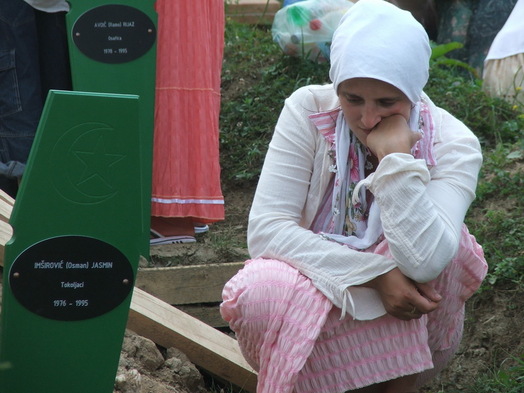
Serbian forces killed 8,372 Bosnians in systematic massacres they carried out in July 1995, they raped hundreds of women and young girls. More than 20,000 refugees were forced to leave Srebrenica in one day.
The developments following the end of the Cold War era led to the dissolution of Yugoslavia which was comprised of six federal republics. Bosnia-Herzegovina, one of the republics in Yugoslavia, declared its independence following a referendum in February 1992; however, Serbs, who did not recognize Bosnia’s independence, besieged Sarajevo, launching the 3,5-year-long Bosnian War.
The largest genocide in Europe in the post-World War II era was carried out by Serbs in Srebrenica in July 1995. Serbian forces killed 8,372 Bosnians in Srebrenica and they raped hundreds of women and young girls.
Serbian forces committed every kind of war crime in the east side of Bosnia, which was subjected to a large-scale and systematic ethnic cleansing between 1992 and 1995, in front of the eyes of the world.
Srebrenica massacre
Thousands of Bosnians who fled Serbian attacks took refuge in Srebrenica, which was declared a “safe zone” by the United Nations and was being protected by 400 Dutch UN peacekeeping forces. Around 25,000 of the refugees were placed in an accumulator factory in Potacari, several kilometers away from Srebrenica, by peacekeeping forces. Thousands of defenseless Bosnians in the factory were given to the hands of Serbian forces led by Ratko Mladic, known as Butcher of Bosnia, by Dutch soldiers on 11 July 1995. The Serbian forces separated men over the age of 12 from the women. The women were raped while the men were filled into trucks and buses and taken to death.
More than 12,000 Bosnians who were trying to flee the massacre in Srebrenica and go to Tuzla were shot to death one by one by Serbian soldiers who set an ambush in a mountainous area along their way. Only 3,000 Bosnians managed to survive and reach Tuzla. More than 10,000 people were massacred in the road extending from Srebrenica to Tuzla within 10 days. This massacre in Srebrenica went into history as the first genocide in Europe which was legally documented.
The consequences of the Bosnian War
A total of 312,000 people lost their lives in Bosnia in the war which lasted for 3,5 years, around two million people had to leave their homes while 27,734 people were reported to have gone missing by official sources. An institute in the country investigating the mass graves has reached the body parts of 20,000 missing people over 17 years and 18,000 of these people have been identified. Since bodies of most of the victims were burned or dismembered, efforts to identify the victims continue with difficulty.
The victims who are identified are buried at ceremonies held every July 11. This year, 520 more victims, who have been identified, will be buried at a ceremony which will be attended by conscious people from many parts of the world.
Please click to see Srebrenica photo gallery.